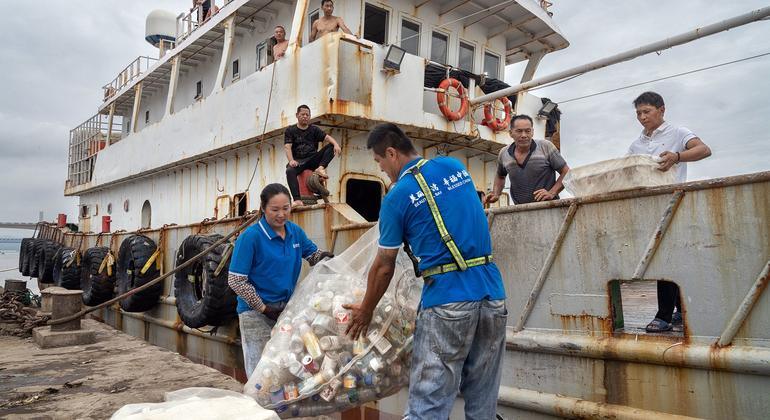“The world wants and in fact needs a conventional plastic treaty because the crisis is getting out of control, and people are frankly outraged.“Said Ener Andersen, executive director of the UN Environment Program (UNEP), the UN agency that directs the conversations.
“We know that plastic is in our nature, in our oceans, and yes, Even in our bodies… What is certain is that nobody wants to live with plastic pollution. “
Out of control
Unless an international agreement is signed, it is projected that plastic production and waste will triple in 2060, causing significant damage, even for our health, according to UNP.
The senior official of the Swiss environment, Katrin Schneeberger, echoed the call for a legally binding treaty, insisting that plastic waste “are drowning our lakes, damaging wildlife and threatening human health. This is more than an environmental problem, it is a global challenge that requires urgent and collective action. “
Speaking to journalists outside the treaty negotiations, Mrs. Schneeberger stressed that “there was no production limit” by the producing countries.
Spirit of commitment?
“Achieve a shared understanding that measures are needed on both production and consumption sides can help unlock negotiations“He said in her capacity as director of the Swiss federal office for the environment.
The supporters of an agreement have compared it with the Paris Climate Agreement in terms of its importance. They have also pointed out that the pressure is supposedly carried out against an agreement by the potters, whose crude oil and natural gas provide the plastics construction blocks.
“We will not recycle to get out of the plastic pollution crisis: We need a systemic transformation to achieve the transition to a circular economy“, Executive Director of UNEP, Inner Andersen, has insisted on previous comments on the need for global plastics regulations.
Virtuoso Circle
With 10 days of conversations scheduled in the Treaty at the UN in Geneva, supporters of an agreement expect the agreement to cover the full life cycle of plastics, from design to production and elimination.
The treaty must “promote plastic circularity and prevent the escape of plastics into the environment”, according to the text that now guides the negotiations directed by the Intergovernmental Negotiation Committee (INC).
In 22 pages, the INC document contains 32 drafts of items that will be discussed per line. The text is designed to shape the future instrument and serves as a starting point for the negotiations of the countries that meet in Geneva.
“Some [countries] They will have to deal with the reduction, others will have to deal with mechanical recycling and others will deal with alternatives, “said Mrs. Andersen.” Let’s see how we can get to this through negotiations. I think there is a lot of good faith in the working group at this time.. “
PNOP conversations follow a decision in 2022 by member states to meet and develop a legally binding international instrument to end the crisis of plastic pollution, even in the marine environment, within two years.
The problem scale is massive, with straws, cups and agitators, carrier bags and cosmetics that contain microperlas only some of the single -use products that end in our oceans and landfills.
In comments to the journalists, Mrs. Andersen recalled that traveling to Pakistan after the mortal floods killed more than 1,000 people in 2022 and seeing that the rubble and the plastic were “a large part of the problem and that is why we are here, find a solution without leaving anyone behind and while ensuring that the economic wheels continue to turn.”
Incapacitating effect
The activists who gathered outside the negotiations expressed their hopes of a treaty as ambitious as possible.
They included Shellan Saling, from California, who is the interim president of the youth plastic Action Network (Ypan). “Plastic affects everything from climate change to health to fertility, even birth defects; affects physical disabilities, as well as invisible disabilities,” he said. UN news Mondays.
Any treaty signed in Geneva will have to be robust enough to accommodate the needs of all countries in the world whose focus differs with respect to plastic design, production, waste and recycling. You will also have to endure the test of time, said Mrs. Andersen.




